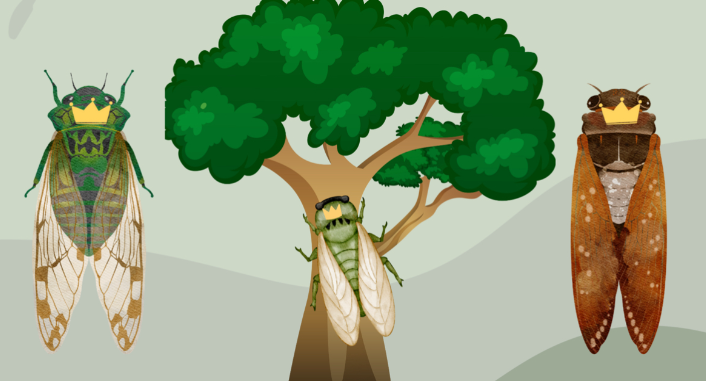As summer rolls in, an almost too familiar noise hums in the background. After a long hiatus, the millions of cicadas in Illinois are throwing the ultimate party. Billions of year 13 and 17 year cicadas, part of brood XIII and XIX, are emerging together. As they fill the air with their distinctive humming this summer here is a little insight on them and what to expect.
Periodical cicadas spend most of their underground as babies and feed off sap from the roots of trees. Eventually (depending on their cycle length) they come out from underground in the billions and mate. The droning sound one usually hears in the summer is the males’ mating call made by vibrating a membrane on the sides of their bodies. They have to be quick about this process though as virtually every animal bigger than them is a threat. To combat their natural feebleness when it comes to defense they emerge in the hundreds of millions in hopes to overwhelm their predators, mate, lay their eggs, and start the cycle again.
Additionally, this is the first time both broods have overlapped since 1803 making this the first synchronization in over 221 years, scientists have estimated the next time both broods will overlap again is in the year 2245.
Moreover, scientists are interested in this historical brood overlap as it presents a rare chance to study the connections between the different cicada species and their effects on Illinois and the Greater Midwest Region’s ecosystem. Due to the two broods emerging at the same time, researchers can see how the various species interact, compete for resources, and possibly (though unlikely) even hybridize. In fact in recent years scientists such as Prof. Martha Weiss at Georgetown CAS have begun to study how cicadas coincide with other insects, especially ants. Weiss predicts that as the cicadas emerge the ant’s job system will change in order to keep up with the millions of new cicadas compared to the usual annual broods.
What’s more, many have misconceptions about cicadas and see them as either repulsive or just annoying creatures when in reality they do so much for the environment. Cicadas help oxidize lawns and since they usually die underground, they can improve water filtration and add nutrients to the soil after decomposing.
Biology and Zoology instructor Sarah Buhmann expands on why.
“Cicadas are annoying but they’re not harmful to us,” Buhmann said. “They can’t bite or sting us and they really have no defense. So we should all just leave them alone. They’re gonna be annoying but they just wanna lay their eggs so just ignore them and they’ll ignore you.”
Overall, it is important to recognize that cicadas aren’t harmful, and the biggest threat they pose is a lack of sleep.











Liz Mcenery • May 18, 2024 at 10:36 am
Great opening paragraph- love your writing style!